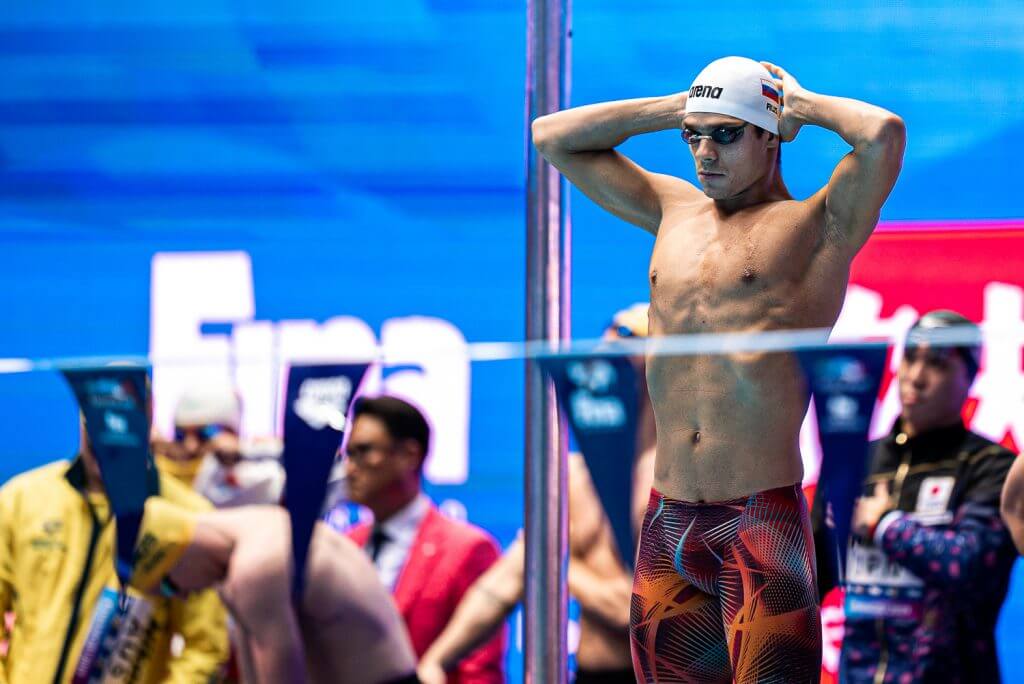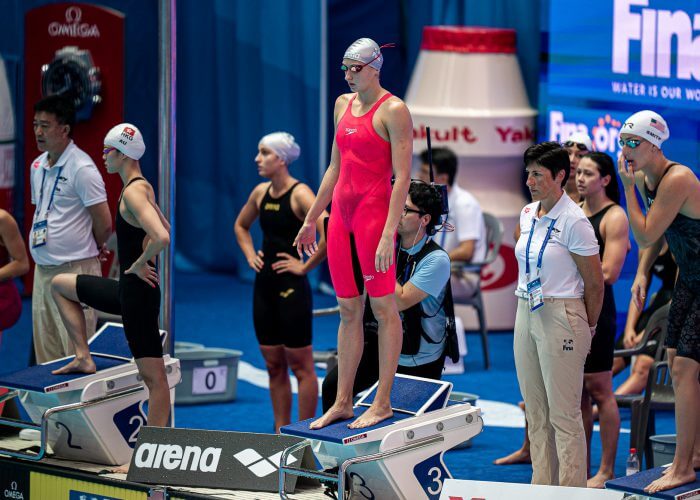Russian National Swim Team Returns to Pool Training in Kazan

Earlier this week, members of the Russian National Swim Team returned to pool training in Kazan where elite athletes were allowed to train in compliance with a number of restrictive measures. Since March, athletes have not had the opportunity to train in the pool due to the coronavirus pandemic.

Veronica Andrusenko, nee Popova – Photo Courtesy: Becca Wyant
“In Kazan, they are allowed into the pool wearing masks and gloves,” Veronika Andrusenko told Russian News Agency RIA Novosti. “You come in and they measure the temperature, spray your hands with an antiseptic when you take off your gloves. There are one or two people on the track so as not to disturb discipline and social distance. The trainers on the sides are wearing masks and gloves. But the sensations from the water are amazing! You understand how you missed this, why you were in a bad mood.”
Andrusenko, formerly Popova, commented that being back in the pool made her realize just how much she missed the water.
“True, it’s a bit heavy in the first trainings after the break. Yes, we tried to stay in good shape at home, trained, even bought a treadmill, but there was little work on hand. The density in the water is different, and everything is going heavy, a lot of stress on the shoulders. But the very sensations of being in the water are very high, you realize how much you missed it and how you expected it,” she added.
Andrusenko turned 29 in January and is aiming for her third Olympic Games in Tokyo with the Russian National Swim Team. She has finished as high as sixth in the 200 freestyle at the 2012 Games. Andrusenko holds two World Championships medals in relays.
Two-time reigning World Champion Evgeny Rylov was also among those back in Kazan with the Russian National Swim Team as he is pushing for his second Olympic Games after winning a bronze in the 200 back in Rio. Since, he has won the last two World titles in the 200 back in 2017 and 2019, and also had the top time in the world in 2018.
“It will be hard,” Rylov said of returning to the pool after some time away. “But I don’t think that such a break is critical for us. It is unlikely that it will be able to seriously affect our further results. It will be more difficult for those who swim long distances. There is a year left before the Olympic Games. We have time for preparation.”
Rylov had been out of the water for some time, which he revealed he had done before. Three years ago, he said he was out of the pool for three months for a shoulder injury. During this time out of the water, he kept himself busy by staying on a dryland exercise routine.
“On Monday, Wednesday and Friday, I have two workouts per day – morning and evening, on Tuesday and Thursday – one at a time. Each workout lasts two hours. Sunday is a day off.
“It is important for a professional athlete to observe the daily routine. If you start to get out of it, then it will be harder to enter it. And this just can greatly affect the return to full training after a long pause.”
The Russian National Swim Team also participated in a viral social media challenge during quarantine:
The World Anti-Doping Agency had banned the Russian Federation from flying its flag at international sports events for the next four years in response to the manipulation of data related to thousands of doping tests, meaning that Russia would not be able to compete at the Tokyo Olympic Games.
However, the ban also leaves the door open for individual Russian athletes top prove themselves innocent and compete under a neutral flag. Those Russian athletes who are not implicated in doping may compete at a second straight Olympic Games, after Rio 2016, in neutral uniforms and with no flag nor anthem to accompany any medals they may win.




I thought they were banned from competition
No, they are not. They are banned only from certain types of competition and only then in certain circumstances.